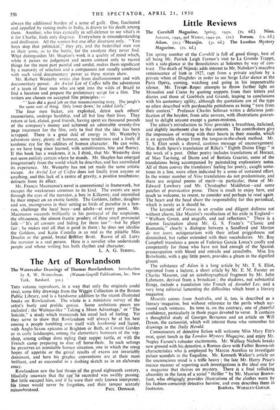Little Reviews
Autumn, 1949, and Winter, 294.9-co. (2s.) Forum. (Is. 6d.) THE spring number of the Cornhill is full of good things, best of all being Mr. Patrick Leigh Fermor's visit to La Grande Trappe,
with a side-glance at the Benedictines at Solesmes by way of con- trast. The death of Nijinski adds interest to Mr. Nabokov's macabre reminiscence of hint in 1927, rapt from a private asylum by a private whim of Diaghilev in order to see Serge Lifar-dance at the Paris Opera, coming, watching and going in hig impenetrable silence. Mr. Trevpr, -Roper attempts to throw further light on Mussolini and Ciano by quoting snippets from their letters and diaries and those of Goebbels and Grandi, leaping to conclusions with his customary agility, although the quotations are of the type so often described with pardonable pettishness as being " torn from their context." Professor Charles Seitman writes a delicious justi- fication of the hoyden, from attic sources, with illustrations guaran- teed to delight anyone except a games-mistress.
The editor's introduction to Nine provides a breathless, italicised, and slightly incoherent clue to the contents. The contributors give the impression of writing with their hearts in their mouths, which is an agreeable change from the tongue-in-the-cheek method. Mr. T. S. Eliot sends a shrewd, cautious message of encouragement. Miss Ruth Spiers's translation of Rilke's " Eighth Duino Elegy " is the work of a poet. Other poetry includes translations of Horace, of Mao Tse-tung, of Dante and of Battista Guarini, some of the translations being accompanied by painstaking explanatory notes. All of them convey the translators' feeling for poetry, caught some- times in a line, more often indicated by a sense of sustained effort. In the winter number of Nine translations do not predominate, and there are original poems of merit—in particular, those of Mr. Edward Lowbury and Mr. Christopher Middleton—and some patches of provocative prose. There is much to enjoy here, and much to welcome, to resent, to consider and perhaps to read again. The heart and the head share the responsibility for this periodical, which is surely as it should be.
The keynote of Forum is an erudite and diligent dullness not without charm, like Mazzini's recollection of his exile in England- " Walham Green, and seagulls, and sad reflections." There is a solemn fascination about. Mr. G. S. Frazer's " Classic and Romantic," clearly "a dialogue between a Sandford and Merton de nos fours, octogenarians with their infant priggishness not diminished, but rather extended with their vocabularies. Mr. Roy Campbell translates a poem of Federico Garcia Lorca'S coolly and competently for those who have not had enough of the Spanish preoccupation with blood and entrails and cerecloths. Miss Iris Birtwhistle, with a gay little poem, provides a gleam in the dignified gloom. The substance of "Adam is a long article by Mr. T. S. Eliot, reprinted from a lecture, a short article by Mr. E. M. Forster on Charles Mauron, and an autobiographical fragment by Mr. John Lehmann, derived from a broadcast ; the shadows, not substantial things, include a translation into French of Annabel Lee, and a very long editorial lamenting the difficulties which beset a literary magazine.
Meanfin comes from Australia, and it, too, is described as a literary,magazine, but without reference to the perils which sur- round such ventures. Its tone is, on the contrary, one of ,cheerful confidence, particularly in those pages devoted to verse. It contains a thoughtful study of Georges Bernanos and an article on Will Dyson, the cartoonist, which will interest those who remember his drawings in the Daily Herald.
Connoisseurs of detective fiction will welcome Miss Mary Fitt's neat, quiet touch in the London Mystery Magazine, and enjoy Mr. Negley Farson's robuster excitements. Mr. Wallace Nichols breaks new ground with his detective, a Ronian slave with Father Brown-ish characteristics who is employed by Marcus Aurelius to investigate palace scandals in the Esquiline. Mr. Kenneth Walker's article on the unconscious mind is a trifle heavy ; the late Mr. Harry Price's rococo manner of reporting such investigations is the ideal one for a magazine that thrives on mystery. There is a final rollicking absurdity in the form of a serial " thriller " by Mr. Maurice Brown- foot, who obligingly provides illustrations of the clothes worn by his fashion-consciotH- detective heroine, a9d even describes them in






































 Previous page
Previous page